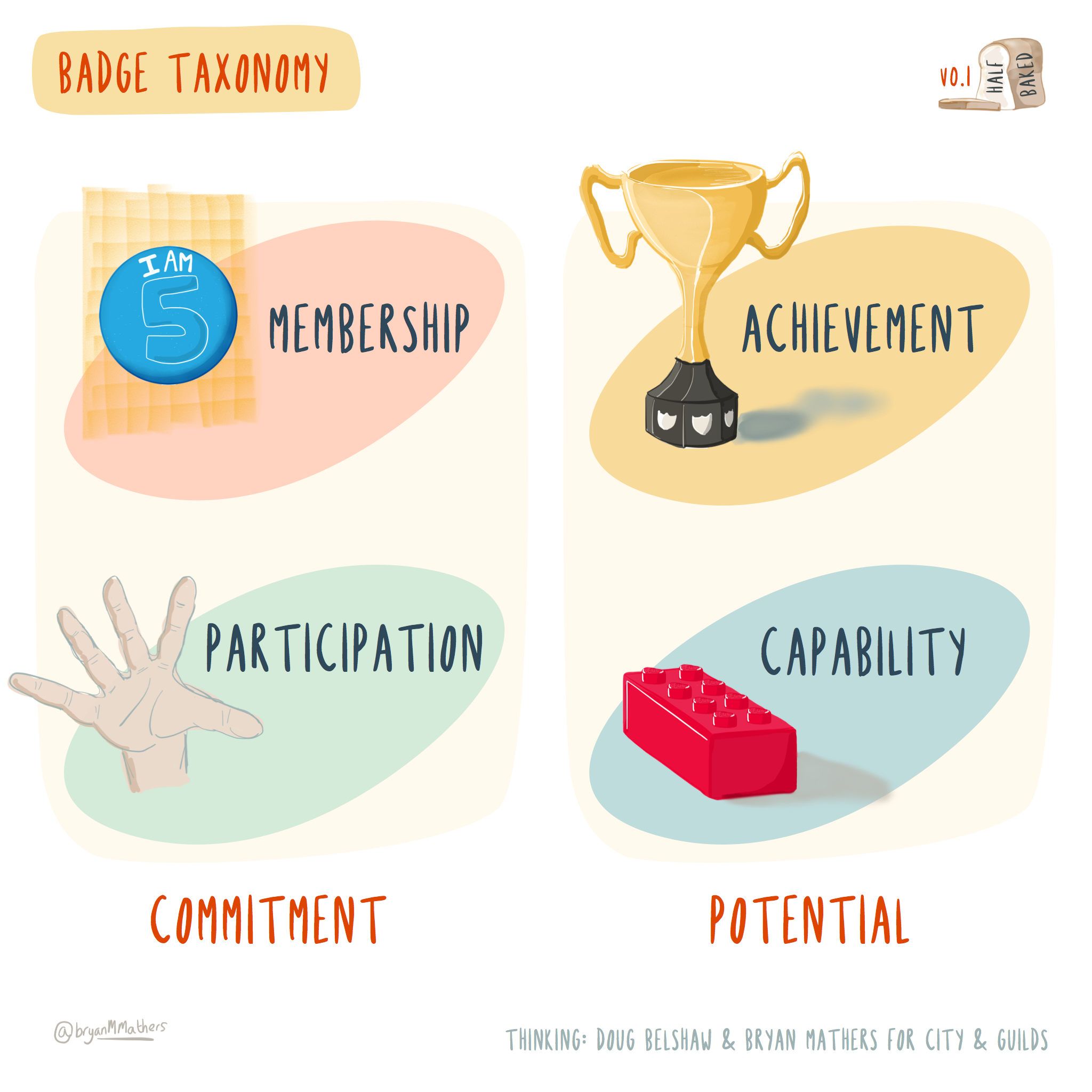Towards a taxonomy of Open Badges for City & Guilds

Earlier this year, Ilona Buchem put together a helpful Digital Badges / Open Badges taxonomy. I’ve referred to it several times in my consultancy work.
Today, Bryan Mathers and I had a think about what this would look like in a City & Guilds context. We decided to remove badges for Potential, for Commitment, and for Encouragement – leaving us with those featured in the diagram above and the list below:
- Achievement badges
- Capability badges
- Membership badges
- Participation badges
To explain our reasoning:
- Potential is a subjective notion based on opinions about another person’s Capability.
- Commitment doesn’t really seem to be helpfully demarcated from Participation.
- Encouragement reflects the psychological state of a learner that is outside the badge issuer’s control.
As the small logo in the corner of the image suggests, this isn’t finished thinking. We’d love your comments and feedback!

Great to see work on an Open Badge taxonomy being taken forward 🙂
I have a question re the Capability badges – would they include attributes / things like curiosity, commitment, discipline for example? Commitment and discipline come up often in discussions with employers and one of the attributes that came out of discussions with Mozilla about what they look for in employees, is curiosity… so wondering where they might fit.
Hi Grainne, thanks for the comment! We definitely need to do some more thinking here. 🙂
I guess we avoided things like curiosity, commitment, and discipline because these are more subjective judgements and a step removed from the behaviour itself. The instruments we use to assess and measure are always proxies, and I guess we considered a badge for ‘commitment’ as having to be filtered through the lens of one of the four types of badges above.
Food for thought, though – we’ll keep you posted!
Thanks, yes def interested to hear how this develops. I think it’s very timely! 🙂
Just to add another element that perhaps has a link to this discussion is that one thing we considered in the Discovery project were clusters of badges for those more intangible attributes like curiosity, commitment etc. So perhaps using a few badges and a bit of narrative to show how they help demonstrate that attribute. Eg having badges for a wide range of different hobbies, could perhaps show curiosity, while having many badges for one hobby might perhaps show discipline and commitment.
Not sure if the cluster idea would work as a model but thought I would just add it to the mix!! I guess it would pose a challenge for tagging though as it would be tagging a cluster rather than individual badges…
Hi Doug
Let’s think now…. 😉
Capability — that’s absolutely fine, and the kind of thing assessments are all about. It represents an assessment of a person’s inner disposition / state which could be useful or significant in some way to someone else. As such, I don’t see any great distinction between capability and competency or indeed intended learning outcome, including as they do knowledge, skill, competence, etc.
Participation — again, clear enough. It’s about whether someone has performed a certain range of actions or activities in a given context, whether that is simply turning up and being at a certain place at a certain time, or clicking particular buttons on a particular web interface within certain constraints. It could be turning up to a birthday party and singing “Happy Birthday”; it could be going on a march holding a banner; it could be contributing 5 times in a web forum. No judgement of quality would normally be implied.
Membership — not so sure about this. Being accepted for membership covers a multitude of sins. It could be simply a self-identification. I have no problem with people having badges proclaiming their self-declared membership — people do it with football teams etc. very often. But that’s not particularly helpful, as people can change their colours at any time. Membership criteria are extremely diverse. What kinds of membership are of interest for proper badges? Some membership criteria include, or simply are, achievements, or assessments of capability. Are these going to count in both categories? What I’m saying here is that membership is not a very clear category, to say the least.
Achievement — now here’s a real challenge! What kind of achievement is of interest for badges? Some things which are “achievements” for some may be trivial for others. Is there a level of difficulty or challenge implied? Even more tricky, perhaps: gaining a recognised qualification may simultaneously be seen as an achievement, or may be seen as a recognition of capability. Gaining a badge may be seen as an achievement in itself….
I’d be happy to contribute my thinking to clarifying a taxonomy further, if you’re interested…
Hi Simon, thanks for your comment. 🙂
I think the important piece here is that we’re focusing on the content part of the taxonomy that Ilona Buchem began to identify. As such, I think some of the problems you identify are mitigated when we also think about issued badges being part of a process.
So, in terms of Achievement badges, these could recognise things that Capability can’t, or could be one-off, unicorn-style badges. Perhaps the naming needs some work?
Sure, good naming helps understanding 😉
Ilona Buchem’s analysis seems to be useful at a surface level of describing what can be observed. What perhaps we should aim for is to get beyond this, towards a taxonomy that represents something more essential and fundamental about the various nature of badges.
What I’m saying (so far) is that there *is* a clear distinction between recognising capability and recognising participation. What is the clear distinction you are proposing for “achievement” — whatever you call it?
Simon